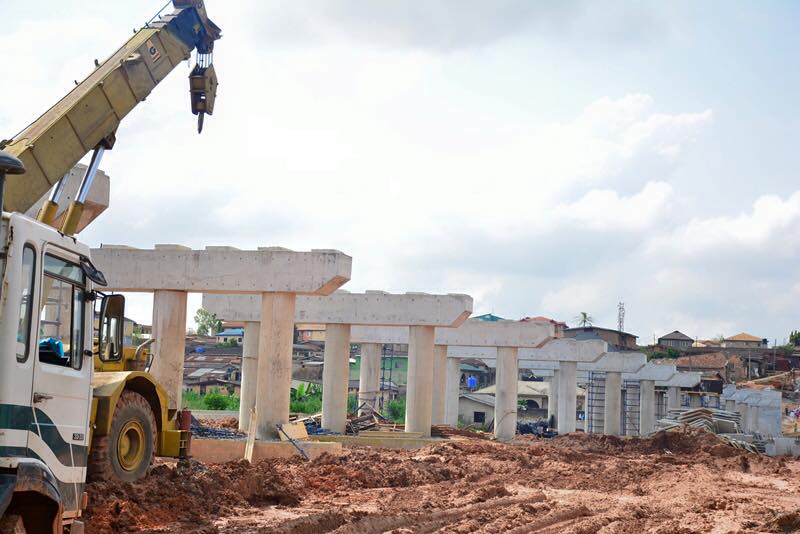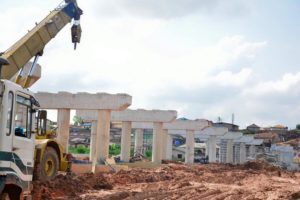General
Lagos-Badagry Expressway Expansion Ready 2019—Ambode


By Dipo Olowookere
Lagos State Governor, Mr Akinwunmi Ambode, on Thursday assured residents that the ongoing Lagos-Badagry Expressway expansion project would be completed before the end of 2019.
The Governor, who spoke shortly after embarking on extensive inspection of ongoing projects across the state, said the project was a major economic catalyst for Lagos and therefore his administration was totally committed to seeing it through.
Recalling that his recent visit to Denmark was to finalise plans with APM Terminals to fast-track the commencement of work on the $2.6 billion Badagry Deep Sea Port, Mr Ambode said it was important for the road network to be completed within schedule to accommodate the anticipated increase in economic activities within the axis.
“On the part of government, it is imperative that the project is accelerated and completed on schedule. It is a 10-lane expansion project with a provision for rail,” he said.
Governor Ambode said that though the project was awarded to Okokomaiko, his administration was almost at financial close to give it to a concessionaire who is expected to extend the project from Okokomaiko to Seme Border.
“We believe strongly that the contractor has done a good job here. We have given him the right of way and it is our belief that the one that has been awarded should be completed on schedule. I am committed to this project; I am committed to the expansion of the economy of the East axis of Lagos. That is the surest way to go.
“By doing this project, we would also expand the real estate value of this axis and the tourism potentials of the Badagry axis. I am confident that in no time, we should have a complete project before the end of 2019,” he said.
Explaining the progress of work done so far, General Manager of Chinese Civil Engineering Construction Company (CCECC), South West, Mr Guan Shuai, said extensive work had been done on three Flyovers and Interchange Bridges in Alaba, Agboju and Alakija.
He noted that the challenge of relocating pipes and cables belonging to the Nigeria National Petroleum Corporation (NNPC) which hitherto slowed down the project had been resolved through the intervention of Governor Ambode.
While inspecting the stretch of link road from Agbelekale off Ekoro Road to Abesan Estate via Church Street, Giwa and Aboru, Governor Ambode expressed satisfaction with the progress of the project so far, but charged the contractor and supervisors to ensure the delivery of the project within the first quarter of 2017.
The Governor, who was received amidst fanfare by residents who displayed placard of various inscriptions commending him for the project, said the bridge being constructed as part of the project had to be extended from 240meters to 360meters due to the nature of soil in the area.
He said: “Just about five months ago, we were here to see the progress of this project. This road is designed to connect all the people living in the Aboru area to Iyana-Ipaja and also to the LASU-Iba road and all the people living within the Ajasa Community. You will recall also that just about three months ago, we were here to open up the Ajasa Command road and this is another project to complement the opening up of the Alimosho community.
“Like the contractor has promised, we hope to finish this project by the end of January next year. We have also found out that we need to extend this bridge by an additional 120 meters because of the nature of the soil in this area. I had earlier promised that this project would be delivered by the end of this year but I’m pleased with the progress being made on this project. I want to urge the contractors and the supervisors to ensure that we meet the completion date and that within the first quarter of next year, all the people in Alimosho will enjoy this facility,” he said.
At Irede Road in Oriade Local Council Development Area (LCDA), Governor Ambode was briefed by the Commissioners for Works and Infrastructure, Engr. Ganiyu Johnson and Housing, Mr Gbolahan Lawal, who narrated the inter-ministerial work being planned for the axis.
Mr Lawal said a 30 hectare land at Ado Trade Fair had already been designated for a 500 Housing Units which would be constructed in partnership with the private sector.
He said the project, which is a transit oriented development, would open up the area for economic activities and real estate, adding that it would complement the 13 stations of the Blue Line Rail Project and 10-lane Lagos-Badagry Express road.
In his response, Governor Ambode expressed displeasure with the state of Irede Road, assuring that work would start on the road within the next four weeks.
He said: “It is very clear that this Irede road is in a very deplorable condition. I have come personally to see it and I have received complaints from people of this community. I also see that the economic value that we stand to benefit from upgrading this road is unquantifiable.
“Beyond the fact that we will open up the road to the Lagos Badagry Expressway, we also intend to expand our housing policy and the rent-to-own scheme to this neighbourhood. So, I like to just clearly state that work would commence on Irede Road within the next four weeks,” he said.
General
Nigerian Bottling Company Bridges Education, Employability Gap

By Modupe Gbadeyanka
The Nigerian Bottling Company (NBC) has reaffirmed its determination to bridge the gap between education and employability in the country by sustaining its flagship Youth Empowered (YE) programme.
This initiative provides hands-on learning, real-world insights, and access to career-shaping opportunities to young Nigerians.
The 2026 edition of the scheme commenced on February 2 at the University of Lagos (UNILAG), with participants mainly young people between the ages of 16 and 35.
A statement from the organisation said this year’s rollout will expand to more tertiary institutions, including the Federal University of Technology, Akure (FUTA). This follows a successful 2025 tour that reached seven cities across the country, including Makurdi, Jos, Benin, Kaduna, Asaba, Akure, and Port Harcourt.
Participants in the 2026 programme will receive training across key modules designed to support personal, professional, and business growth, including Business Life Skills, Adaptability and Resilience, Financial Literacy, Customer Service and Communication, Sales and Negotiation Skills, and Workplace Ethics.
The sessions will also feature breakout workshops on Business Planning, Project Management, and Time Management, alongside the Director’s Grant Pitch Competition, where participants can pitch their ideas for a chance to win business funding.
In addition to skills development, NBC’s People and Culture team will be present throughout the programme to identify outstanding talent for future opportunities within the organisation, further strengthening the connection between learning, employment, and long-term career growth.
One of the participants at the UNILAG training, Waliat Adedogun, who received a cash grant through the Director’s Grant Pitch Competition to support her small business, said: “Youth Empowered gave me more than training; it gave me clarity and confidence. Winning the grant means I can finally take my business idea from a dream into something real. I now feel prepared to build, grow, and create opportunities not just for myself, but for others too.”
Since its launch in 2017, the scheme has impacted more than 70,000 young Nigerians, equipping participants with practical skills, confidence, and exposure needed to succeed in today’s dynamic workplace and entrepreneurial landscape.
This year’s programme is being delivered in collaboration with Fate Foundation as the implementing partner, with funding support from The Coca-Cola HBC Foundation.
Last year, 10 beneficiaries were selected for six-month paid internships across NBC locations in Lagos, Ibadan, Asejire, and Challawa, gaining direct industry exposure.
Additionally, three outstanding participants received sponsorship for an all-expenses-paid intensive culinary training programme and were awarded N1 million each to support the launch of their businesses.
General
INEC Fixes February 20 for 2027 Presidential, NASS Elections

By Modupe Gbadeyanka
The 2027 presidential and National Assembly elections will take place on Saturday, February 20, the Independent National Electoral Commission (INEC) has revealed.
In a notice for the 2027 general polls issued on Friday, the electoral umpire also disclosed that the governorship and state assembly elections for next year would be on Saturday, March 6.
Speaking at a news briefing in Abuja today, the chairman of INEC, Mr Joash Amupitan, expressed the readiness of the commission to conduct the polls next year, which is 12 months away.
The timetable issued by the organisation for the polls comes when the federal parliament has yet to transmit the amended electoral bill to President Bola Tinubu for assent.
This week, the Senate passed the electoral bill, reducing the notice of elections from 360 days to 180 days, while the transmission of results was mandated with a proviso.
Recall that on February 4, INEC said it was ready to go ahead with preparations for the elections despite the delay in the passage of the amended electoral law of 2022.
General
NGIC Pipeline Network to Experience 4-Day Gas Supply Shortage

By Modupe Gbadeyanka
The pipeline network of the NNPC Gas Infrastructure Company Limited (NGIC) will witness a temporary reduction in gas supply for four days.
This information was revealed by the Chief Corporate Communications Officer of the Nigerian National Petroleum Company (NNPC) Limited, Mr Andy Odeh, in a statement on Thursday night.
A key supplier of gas into the NGIC pipeline network is Seplat Energy Plc, a joint venture partner of the state-owned oil agency.
It was disclosed that the facility would undergo routine maintenance from Thursday. February 12 to Sunday, February 15, 2026.
The NNPC stated that, “This planned activity forms part of standard industry safety and asset integrity protocols designed to ensure the continued reliability, efficiency, and safe operation of critical gas infrastructure.”
“Periodic maintenance of this nature is essential to sustain optimal system performance, strengthen operational resilience, and minimise the risk of unplanned outages,” it added.
“During the four-day maintenance period, there will be a temporary reduction in gas supply into the NGIC pipeline network. As a result, some power generation companies reliant on this supply may experience reduced gas availability, which could modestly impact electricity generation levels within the timeframe.
“NNPC Ltd and Seplat Energy are working closely to ensure that the maintenance is executed safely and completed as scheduled. In parallel, NNPC Gas Marketing Limited (NGML) is engaging alternative gas suppliers to mitigate anticipated supply gaps and maintain stability across the network,” the statement further said.
“Upon completion of the maintenance exercise, full gas supply into the NGIC system is expected to resume promptly, enabling affected power generation companies to return to normal operations,” it concluded.
-

 Feature/OPED6 years ago
Feature/OPED6 years agoDavos was Different this year
-
Travel/Tourism10 years ago
Lagos Seals Western Lodge Hotel In Ikorodu
-

 Showbiz3 years ago
Showbiz3 years agoEstranged Lover Releases Videos of Empress Njamah Bathing
-

 Banking8 years ago
Banking8 years agoSort Codes of GTBank Branches in Nigeria
-

 Economy3 years ago
Economy3 years agoSubsidy Removal: CNG at N130 Per Litre Cheaper Than Petrol—IPMAN
-

 Banking3 years ago
Banking3 years agoSort Codes of UBA Branches in Nigeria
-

 Banking3 years ago
Banking3 years agoFirst Bank Announces Planned Downtime
-

 Sports3 years ago
Sports3 years agoHighest Paid Nigerian Footballer – How Much Do Nigerian Footballers Earn












